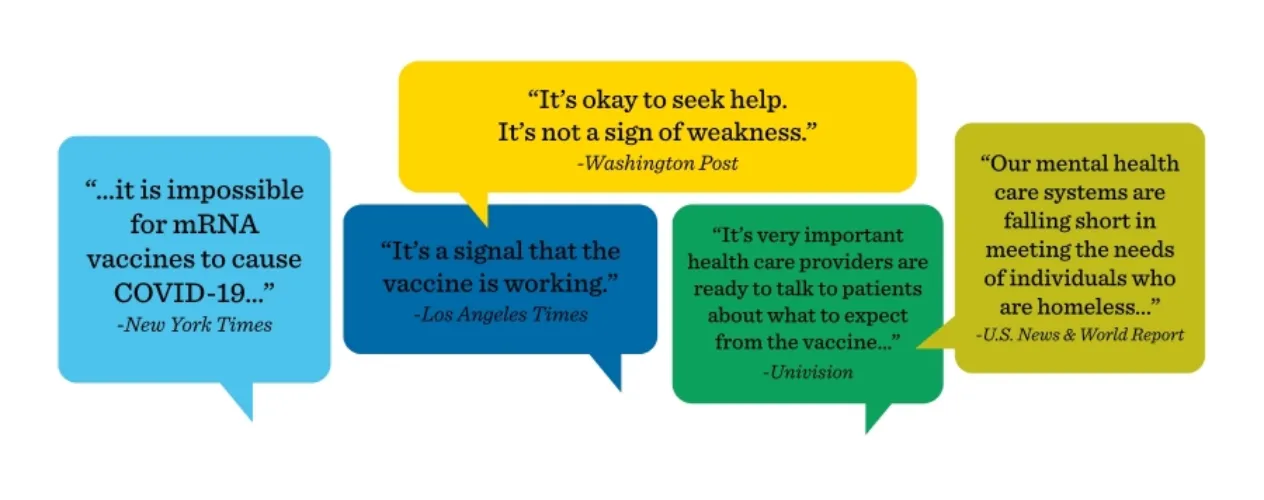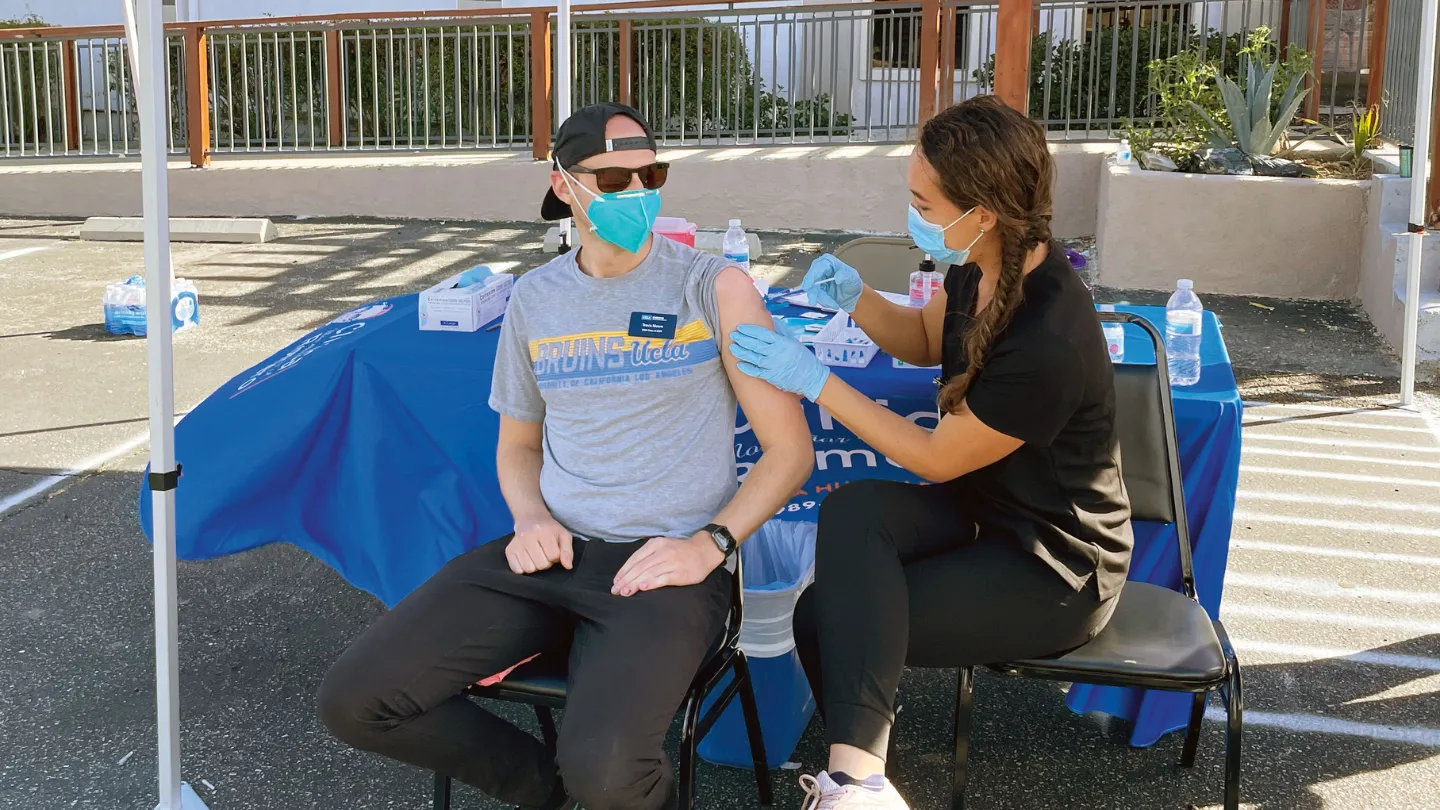Trusted Source
After participating in a volunteer subject in the Pfizer-BioNTech trial, Dr. Kristen Choi (MS '18) capitalized on an unexpected news-media platform to communication clear and accurate information about the COVID-19 vaccine.

SCROLLING THROUGH INSTAGRAM IN AUGUST 2020, DR. KRISTEN CHOI (MS ’18), assistant professor in the UCLA Fielding School of Public Health and the UCLA School of Nursing, came across an ad that would dramatically alter how she’d spend her days.
Pfizer was seeking participants for the Phase 3 clinical trial of the Pfizer- BioNTech COVID-19 vaccine, and Choi, a registered nurse who sees patients as well as conducting research on mental health and mental healthcare policy, decided to volunteer. Following her second dose, Choi’s fever spiked to nearly 105, with symptoms prompting her to wonder if she had COVID-19. “We now know fever is a reaction some people experience, but at the time it was scary because these vaccines were so new,” Choi recalls.

In addition to her extensive media engagement, Choi, a nurse, volunteered he services in administering COVID-19 vaccines across greater Los Angeles, reaching some of the most vulnerable communities.
She wrote about the experience, in part to alert other healthcare professionals of the need to prepare patients to understand that the adverse effects were normal, an indication of the body’s immune response. Choi’s article was published in the journal JAMA Internal Medicine on Dec. 7, 2020 — four days before the FDA issued an emergency use authorization that made the Pfizer vaccine the first to be rolled out to the U.S. population. Just like that, Choi found herself barraged with inquiries from news-media outlets seeking her perspective.
Such visibility wasn’t something Choi ever planned, but she has always sought to make an impact through her work — which is what led her to pursue a UCLA Fielding School master’s degree after earning her doctorate in nursing. As a high school student, Choi picked nursing “without giving it much thought,” she says, viewing it as the ideal combination of a science-focused field with a human element. But in nursing school, as much as she loved her interactions with patients, she became discouraged by the barriers nurses faced in their clinical practices, and the inequities in the care patients received.
Choi opted to become a nurse researcher — focusing on health services and policy approaches to mental health, particularly as they affect vulnerable and adolescent populations, while continuing to practice as a child and adolescent psychiatric nurse. Toward that end, she obtained her MS in FSPH’s Department of Health Policy and Management. “It was a great program that allowed me to go outside of my training as a nurse to think about research from the public health perspective, while gaining the data-science and methods skills I needed to do the system-level studies I was interested in,” she says.
COVID has taught us that public health communication is an incredibly important responsibility.
Choi sought to use her newfound media platform to address concerns about the vaccines and speak on the results from the clinical trials in ways non-scientists could understand. “Those studies tend to be full of jargon, and a lot of people don’t know how to make sense of the data,” she notes. “I also knew as a nurse that when we give vaccines, we’re often rushed and don’t always do a good job of answering people’s questions and helping them understand why the vaccine is important.”
Choi says she understood the hesitancy many initially felt based on the speed with which the vaccines were developed and the fact that the Pfizer-BioNTech and Moderna versions were the first to use messenger RNA technology, which teaches cells how to make a protein that will trigger the body’s immune response. That hesitancy became less justifiable, she says, in the face of the overwhelming evidence that has now been compiled on the vaccines’ safety and efficacy. In research she conducted on vaccine hesitancy, Choi found that people with deeply held anti-vaccine beliefs were unlikely to be moved. “I see my role as targeting those who are on the fence and still open to it,” she says.
While fulfilling media requests, Choi also felt a responsibility to get personally involved. She volunteered all over greater Los Angeles, from the Dodger Stadium mass vaccination site to mobile clinics and community-based sites. “Seeing the excitement in those early days was one of the most touching experiences of my career,” Choi says. “People were crying and laughing, taking photos and videos, so grateful to be getting vaccinated. To be able to have conversations with them, knowing that in a very small way I got to be part of the science that made it happen, was powerful.”
One of the major driving factors for Choi was to help reach some of the most vulnerable communities, which led her to participate in efforts to bring the vaccine to undocumented migrant workers and individuals living in homeless encampments, as well as other underserved groups. “Unfortunately, COVID has brought to light the glaring inequities in our healthcare system,” Choi says. Her dedication to matters of social justice extends beyond issues related to the pandemic. At the height of the Black Lives Matter protests against racism and police brutality in spring 2020, Choi brought together 20 nursing colleagues to coauthor an article, published in the International Journal of Nursing Studies, reflecting on ways that racism and unjust policing affect the profession, and how nurses could challenge racism in healthcare.
Choi’s selection in late 2020 as the only nurse on the Forbes 30 Under 30 Healthcare list, which highlights leaders in the field who are younger than 30, was especially meaningful given its timing. Before the onset of the pandemic, the World Health Organization had declared 2020 the International Year of the Nurse and Midwife in a nod to their historic contributions. As it turned out, the role of nurses was as critical as ever, but for reasons that couldn’t have been anticipated.
“Knowing that nurses’ impact is often underappreciated, it was a big honor to be recognized, and it was great to get emails from students and younger nurses who were inspired to see that representation,” Choi says. “I feel fortunate to have had the opportunity to communicate information about the vaccines and speak to people’s concerns. COVID has taught us that public health communication is an incredibly important responsibility.”
